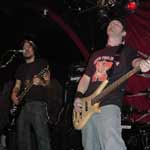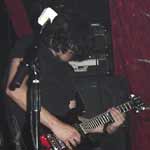Prong is credited as having been one of the few bands in the early nineties to help keep metal alive amidst the pervasive dirty flannel backdrop that was grunge. The road wasnít easy though for a band that didnít seem to fit cleanly in any specific genre, and to make matters worse, Tommy Victorís hard luck group has seen more members come and go than Asia Carrera. After its classic record Cleansing, which contained such Prong staples as ďSnap Your Fingers, Snap Your NeckĒ and ďBroken Peace,Ē many believed the band poised to make a significant imprint on the face of a music scene that was looking for a change of direction.
Instead, the group disbanded after Rude Awakening in 1996, and Tommy left New York for Los Angeles and in doing so lost track of the seasons and lost track of time. Of course there was the inevitable introspection that goes along with the disintegration of a personís lifeís work, and there was even apprehension about whether or not Victor would continue in music at all. During some of this time, he did end up collaborating with such musical luminaries as Glenn Danzig, Marilyn Manson and Rob Zombie. Even though some of these working relationships initially left him feeling a bit dissatisfied, he appears to have come to terms with his emotions regarding the perceived crediting slights that have blighted parts of his past.
Itís apparent during this interview that Victor consistently makes an effort to detach himself from the negative feelings he harbors regarding the actions of others. It is also evident that Tommy is instead trying to get to a place in his life where he can simply concentrate on what he is doing and find a level of contentment that he alone is responsible to sustain. Of course, the story of rock and roll is littered with stories about musicians who gave significant parts of their existence only to end up under appreciated and broke, but occasionally there are exceptions and it is easy to hope that Tommy Victor ends up being one of these. As is the case with life though, just as one thinks they are on the road to a certain degree of bliss, events occur that test that particular individualís resolve. In this case, the obstacle came in the theft of six Prong guitars, a kick drum and hundreds of T-shirts and CDs from their van after the group arrived in Texas to do a show just a few days after this interview was conducted in support of their new effort Scorpio Rising.
Such is the glamorous life of a musician.
If youíd like to contact Tommy because you dig his music or just because you need a friend, you can drop him an email at [email protected]. He will respond.
 KNAC.COM: When you were wandering around LA and you were trying to figure out whether or not you were ever going to get back in the music business, was not having to do interviews one of the positive aspects of staying away?
KNAC.COM: When you were wandering around LA and you were trying to figure out whether or not you were ever going to get back in the music business, was not having to do interviews one of the positive aspects of staying away?
VICTOR: No, why, did I run into you somewhere?
KNAC.COM: No, it just seems like that would be one of parts of the job that a musician might get wary of doing.
VICTOR: No, itís jut that I get kind of uncomfortable talking about myself. You know, whatever, Iím all right. Iíve grown up a lot.
KNAC.COM: So youíre saying youíve evolved in a positive way over time? [Laughs]
VICTOR: Well, yeah. You sort of get beaten into submission. Your notions start to get worn off and you become a conformist. My nerves get pounded at times. Right now, Iím just happy to still be doing this, you know, which is unusual for 90% of us.
KNAC.COM: Yeah, true. I donít know if you are referring to this album as your second time around the music business or not, but you have to feel pretty good to just be around at all.
VICTOR: I think itís about the eighth go round. [Laughs] For every record itís like ďare we gonna keep doing this?Ē or ďhow are we going to do this?Ē Itís sort of like a full course meal. You always have a new selection of problems that have to somehow be addressed. You know, Iím sort of slow. Iím like, it takes a lot of time to decide which one Iím going to indulge in. You know, Iíve learned that you have to go for it a little more and not live in the result too much. Fear-driven decision making isóI like to be prudent, but there is a time when you just have to jump in the fire.
KNAC.COM: So there has to be a story behind how the band gets to point of even being able to start each individual album.
VICTOR: Yeah, because thereís always somebody leaving. This guy is quitting and the fights, you know, thereís labels dropping on us--no money in the bank. Itís not like Prong made any dough. Itís like, where are we going to find this dough, and how are we going to pay this guy. You know, believe me, I still have creditors from years ago, so thanks to a couple of really helpful people who were there. I donít discuss it that much, but I owed money. I had to disappear for a while.
 KNAC.COM: Do you think that people really understand the level of personal sacrifice that a musician in your admittedly financially challenged position makes?
KNAC.COM: Do you think that people really understand the level of personal sacrifice that a musician in your admittedly financially challenged position makes?
VICTOR: They donít understand that at all, and thatís not my problem because I canít expect that of people. That is a really good point though because thatís one of the things that used to drive me nuts. ďOh, no. Iím not being appreciated!Ē You know, now I just live for myself. Itís like, you know, I respect what everyone else does, but I donít expect any glory. I donít expect any recognition or anything. I have overcome an impostor syndrome myself. I have to put myself in check and balances any time I start judging someone, Iím like, ďhey, you know what? You have a bunch of things that you need to work on.Ē Then Iówell, I have to put myself in that perspective a lot.
KNAC.COM: So how do you decide what your expectations are?
VICTOR: Once I start getting into expectations mode, I always have to shut down because itís a false economy. You know, you never know whatís going to swing around. You never know. Youíve got to live on a daily path. Again, the problems, the challenges that cross my path in Prong just need to be dealt with. Usually, theyíre not as bad as Iím fearful that they are, so thatís a good thing. When I get into that mode where everything is groovy, thatís more dangerous, you know, the balance thing between the sky and the earth is important.
KNAC.COM: If you could put yourself in a 1992 mindset with regard to what you thought Prong would become versus the way you view the band today, did you think it would be much bigger at that time?
VICTOR: Oh absolutely! I donít know about a huge. I was always questioning where we were going because we never really fit into a genre, and we didnít embrace any cults or clicks but weíd get labeled as hardcore, thrash, Satanism or, you know, Christian rock, whatever. Weíre always laying between those things. I sort of knew that marketability of Prong is always a difficult thing. On the other hand, on a personal level, and this is something Iíve discussed on the new album concerns the whole idea that ďIím doing my job, and I do what I do, and I try my best,Ē and that should be good enough to reap some of these rewards. Thatís wrong though because there are no guarantees on anything. You could devote twenty-four hours a day to something, whether it be a business prospect or a relationship, and it could still fail. There are just no guarantees. Thatís what I realize now. I mean, you know, we live in a chaotic world. I could of written the last record in a day, and it could still be huge, or I could be stupidly diligent as I have been and sell nothing. After being through all these experiences, I realize that, and I appreciate it for what it is. Thatís why I have to center on little steps and what Iíve got to do and be responsible and trust my instincts once in awhile. You know, just go forward.
KNAC.COM: When you came up with the lyrics on this record and you sent the music to the rest of the band, did you have a particular vision in mind or an overall cohesiveness in mind in regard to the overall emotion of the record?
VICTOR: It seems to naturally flow this way. I was in this pattern of thinking of concentrating on spiritual things or things of the unseen so a lot of that comes in, and I feel that I was putting myself through some sort of pain. It was almost like going into a sweat lodge--afterwards, my pores were being let loose, I knew what would come out would be was meaningful rather than just finding little topics and screaming some lines about claiming how miserable my life is. I didnít want to do that. I wanted to fly different trains of thought about what is going on. A lot of it reflects what I was reading at the time too or, I sort of documented those different periods in a lot of those created lyrics so itís almost like itís good for people to keep a diary of some sort and a lot of the lyrics were generated after the fact. We did have some of the music before, and in those cases, I would grab a couple of lyrics and apply them. Whatever I did was being documented through some kind of writing. I think thatís what one has to do--itís one of the approaches.
KNAC.COM: That is when you tear yourself away from the X Box, right?
VICTOR: I havenít been on that recently. [Laughs]
 KNAC.COM: Have you been trying to curb your addiction?
KNAC.COM: Have you been trying to curb your addiction?
VICTOR: Yeah, well, I donít need to be on it right now, but when football season rolls around, itís good to play Madden Football and familiarize yourself with whoís playing. Then Iím downloading the recent rosters--itís better than going on the net and reading the register.
KNAC.COM: I think youíre ok as long as you donít find yourself in front of the TV during the draft for two days. When that happens, youíre beyond all hope.
VICTOR: YeahÖ I did spend part of that Saturday morning watching it. It was just a little bit though.
KNAC.COM: Thatís still getting a little close! When you arenít busy acquainting yourself with the new cornerback for the New Orleans Saints, what is it that youíve been reading?
VICTOR: Recently, Iíve been reading Nietzsche. Iíve been on that trip.
KNAC.COM: That sounds uplifting.
VICTOR: Noódefinitely not. Then I had to go on line and look up sacred-texts.com. I like Chinese stuff like Confucianism or the I Ching, I refer to that a lot. I grew up Catholic where a lot of fundamental ideas in relationships arenít discussed. Real applications of methods of operations are what I try to research. I have done a lot of research on the Bible and Revelations in particular. I will also read stuff like Tom Clancy or James Patterson on a plane or something.
KNAC.COM: So itís not all depressing then?
VICTOR: No, no.
KNAC.COM: What is it that you ultimately take from a book like Revelations?
VICTOR: Every once in a while, Iíll read the Bible for self help, but I donít believe that the Bibleóespecially the book of Revelations--is a self help type of article. What really got me started looking at it was Crowley because he refers to it so often. What I tried to find out reading that was because of all the things that it refers to like the Scarlet woman and then thereís the references to the seven churches. That was something interesting to me because I believe they correspond to the Tree of Life and the Kabbalah, so it was more of an investigation to see if somehow all these religions tie in together in some way. My reading is more of an investigation than trying to get any type of solace from reading the Bible. Nietzsche? You read Ecclesiasticsóitís a total downer. Solomon was a preacher. He had all these things, but he was still miserable.
KNAC.COM: Right. Did you feel like you identified with the misery aspect of what he was going through to some degree?
VICTOR: Life is vain, and I got a lot from that too. Itís just like, all these attempts that people live with and strive for are just all in vain. We live in such a vain society where we grab these things and materials and think thatís gonna help us, but it never does. None of these things work.
 KNAC.COM: Is that why you have chosen to take up residence in what many consider to be the most shallow city on the planet in Los Angeles?
KNAC.COM: Is that why you have chosen to take up residence in what many consider to be the most shallow city on the planet in Los Angeles?
VICTOR: Somebody told me that itís like the modern day Jerusalem. It is in a way with all these people and their fly by night religions. One of the wackiest books Iíve ever read was Conversations With God, and for some cult to come from some guy asking questions of God and making so much money from it is unbelievable. L.A. truly is a bad place for that, but I think New York may be worse because the people donít have any kind of introspection. I think New York may be more spiritually void than L.A.
KNAC.COM: Really?
VICTOR: I believe so. I think at least there are some searchers out there. I think that Satanism has taken over L.A. Obviously, every one is into themselves. Itís a totally LeVay philosophy though where itís all about yourself and your fetishes.
KNAC.COM: And your kinksÖ
VICTOR: And you should be proud of it too. I definitely donít follow that whole thing at all. Thatís just not the way I want to live my life. I think people allow a certain amount of freedom here, but itís still contrived.
KNAC.COM: Donít you think that if everyone lived according to that me first type of code, that weíd end up with a pretty empty collective?
VICTOR: I donít know how other people feel, but I know that being in the rock music business, Iím surrounded by people that thrive on superficiality. Regarding my own personal growth though, I donít think itís my position to try to lead other people and guess about their motives. I try to apply that in my life. Whenever I feel something like jealousy, and I think about trying to go that route myself, I have to step back and wait a minute. In the end, I decide that the best thing I can do is follow my own convictions and my own ideals. I canít worry about other peoplesí motives. I try not to worry about their agendas. Thereís a song on our new record called ďHidden AgendasĒ that discusses that. What one person gets from something is their business, and I have just figured out that I canít answer their questions.
KNAC.COM: I would say that type of ideal would serve you well when you write with someone elseósay Marilyn Manson or Rob Zombie. Everyone knows that the money is in the writing credit, but can you feel shortchanged in other ways as well when you donít feel acknowledged in the way you deserved to be? Have you ever felt directly or indirectly responsible for something that turned up on their discs later on that you werenít credited for?
VICTOR: This issue has crossed my path many, many times, and Iím not going to lie to you. It has sent me into depression, but thereís nothing I can do about it. You know, things are the way they are, and little Tommy Victor is not one to pass judgment on the actual finalization of any situation. I donít have control, so itís like things are the way they are, and I have to just accept whatever it is. The more I live in that way, the more comfortable it is for me. If Iím gonna go around battling every issue that comes in my path, youíre always going to be in turmoil. On the other hand, as a businessman, I understand where a lot of people are coming from with this. I just try to remain understanding and show due respect for whatever happens. Iím not gonna take anything away from anybody. I love both those guys, and I think that what theyíve done is fantastic, but what my say is in these things doesnít matter that much. Itís just like if I could contribute in some way, thatís important. I know that sounds fluffy, but thatís essentially whatís important. Glory is a reallyóyou can talk about vanity, but itís a scary prospect. If I start to feel glorified again, I just put up a stop sign. The ego-generated concepts in my life are things that need to be avoided or put into perspective, and that is my main challenge in life.
KNAC.COM: Even as that is the case, doesnít it make you wary of entering into that type of working relationship again?
VICTOR: No, I think Iím capable now to be able to do that. I think that is actually one of the bigger challenges for me is to learn how to function in more of a supportive role rather than an administrative oneónot many people can do that. For personal growth, I think thatís a great thing to be able to go both ways and kind of be able to flex professionally. It may be difficult and challenging, but for me, I have to be that way. These situations though have entered my life obviously for some reason and are there for me to overcome.
 KNAC.COM: It does seem as if in the realm of writing credits that the territory could get awfully murky in regard to who came up with which particular idea and who should have their name ultimately placed next to the song.
KNAC.COM: It does seem as if in the realm of writing credits that the territory could get awfully murky in regard to who came up with which particular idea and who should have their name ultimately placed next to the song.
VICTOR: Not to sound nihilistic on this, but anything you do is going to be wrong because you are dealing with egos. I know what was done on certain records. I know who was responsible. Other people donít necessarily need to know. On Cleansing, it says ďall songs written by Prong.Ē My name doesnít even appear on that album cover. A guy like Paul Raven though who says, ďIím playing, my name has to be on the record!Ē so I put ďbass playing by Paul Raven.Ē I just said though that I wasnít going to put my name on it. Then, the guys would complain that everything seemed diluted, so then we would have to get into this big long discussion about who did what. Finally, I just said that everyoneís name would go on the fucking thing. Once that happened then everyone thought that since their name was on it that they should get equal writing credit. Now what I do is just have everyone get credit across the board, and fuck all the bullshit. I take the lyrical credit, but I never put ďAll the lyrics written by Tommy VictorĒ on the new Scorpio Rising recordówhoever wants to know will know and for those who donít I could really give a flying fuck.
KNAC.COM: Doesnít that just put a whole pall over the entire artistic process when you work with a specific group of guys in order to achieve the goal of producing something of value only to have that same group bicker at the end over who did what or who did more?
VICTOR: Thatís what I went through for many years with Prong. When money comes into view, thatís when people start to turn into assholes. I can actually say as God is my witness that I made less money off Prong than anybody else that survived in that thing. At times, I went into my own pocket to keep it alive. It is what it is though, and thereís nothing I can do about it. Whether itís worth it or not, I donít know. I canít really worry about it too much though because I donít know what the alternatives are.
KNAC.COM: It sounds as though you got pretty close to exploring some of the alternatives to the music industry during what you referred to as some of your ďlost yearsĒ in Los Angeles. What did you ultimately take from that experience?
VICTOR: I think that by growing up and living in New York, believe it or not, I was naÔve. The biggest shock was getting out of that New York mentality of workaholic hustle and bustle where you are busy all the time and then coming out here where things are different, was a change. On the other hand, back on the east coast, when somebody says theyíre gonna do something, they usually do it. Here though, itís the total opposite. People will bullshit you to the end. Theyíre like, ďdude, Iíll do it. I promise, Iíll do it,Ē and then they never show up to do anything. That happened to me so many times that my attitude was just like ďfuck everybody.Ē I was just disappointed so often that it just allowed me the personal growth to say, ďIím just gonna cover my own self and be satisfied with that.Ē If I go to an appointment, and they donít show up, thatís their problem. Iíve learned enough to respect myself enough to not worry what other peopleís agendas are.
KNAC.COM: It sounds as if youíve tried to take the emotion out of the actions of others in relation to how they deal with you.
VICTOR: Perfectly said.
KNAC.COM: I guess it really is wasted energy if you spend your time becoming upset about the actions of people that you canít do anything about anyway.
VICTOR: Yeah, and it was breaking out of the conditioning of my upbringing of like Catholic school, regimented, punishing type of society. The fear was that if anyone stepped out of line that they were going to get whacked. Out here, everyone steps out of line, and nobody gets whacked. It was really shocking to me to figure this out because I didnít know. Iím just a dumbass kid from Flushing.
KNAC.COM: Was it good or liberating to find this out, or was it just confusing initially?
VICTOR: Whatís good or bad? I donít know. It was just an experience that I had, you know? I think my reaction to the way things are was bad. I was immature. Iíll probably look back on today and go, ďwow, I was a dumbass.Ē Weíre supposed to be adapting here. Iíve never subscribed to the whole concept of the pleasure seeking society in L.A. either. Itís like, ďweíre going on tour to have a good time!Ē Itís like, yeah, you have fun doing what you do, but passion or catharsis that you are going to have just by being in a rock band just isnít there. I donít think it was ever there for them in the first place.
KNAC.COM: L.A. has been famous for that type of attitude with regard to many genres of music for decades.
VICTOR: Possibly, yeah. I have nothing against the guys who do what they do and are hugely successful. I donít do what I do as a reaction to what other people are doing anymore because it is the only way I can go about it for some reason.
 KNAC.COM: Being reactionary regarding every perceived infraction would be a pretty unpleasant way to go about life.
KNAC.COM: Being reactionary regarding every perceived infraction would be a pretty unpleasant way to go about life.
VICTOR: Yeah, and musicians are a weird breed too. We react and we escape and we runóa lot of guys do anyway. The guys though who are straight-headed, take everything for what itís worth and are good businessmen are the guys who are hugely successful, generally.
KNAC.COM: How hard is it to come from the template of an emotional, passionate musician and try to make the transition to a normal type domestic situation with regards to a family and relationships?
VICTOR: No matter how much time or effort I put into going that route, it just never seems to work out for me. Itís like Iím a part of some cult that has an administrative force that goes, ďTommy Victor, youíre not supposed to be doing thisóyouíre off the path.Ē Then, they will pull me off that path and get me back to what Iím supposed to be doing. Iíve tried to put all my energy and effort into those situations in the past, and in the end, I think it might be just a disrespect to your talents or your own creativity to do that. There is just something ingrained in everyone that just sort of pushes them in the right direction. I donít know if Iím going in the right direction now, Iím still searching. I read this book by a guy named Po Bronson called ďWhat Should I Do With My Life?Ē itís kind of like a self help book, but he talks about people who have done all the right things and become like biochemists and whatever, but theyíre miserable. Theyíve had all the successes in the world and have everything going for them, but one day they just decide that they are going to go and open up a donut shop. Then they become extremely happy. Why is this? Who knows? There is something ingrained in everybody that pushes them in the right direction. Like I said, Iím still searching.
KNAC.COM: In the process of searching people are bound to make mistakesódo you think that is just a normal process in getting to where one needs to be? Or do you think have you made more than your fair share?
VICTOR: I donít know. I actually thought of that today. Iíve made a lot of poor decisions, man. I still suffer from the consequences of them continually. The healing of those things may never happen. No oneís gonna tell me that they do get healed. Thatís discussed on the new record to in ďLetter to a FriendĒ within the context of a pseudo betrayal letter to somebody who never got back to you. Thereís no resolve to it. To believe that youíve made attempts to make amends or whatever and that something miraculous is gonna happen that everything is going to straighten out for you just isnít true. Itís what youíre taught when youíre a kid, but itís bullshit. Things never get resolved. Some problems never get solved no matter what you do, theyíll never end.
Certain things youíre just gonna pay for the rest of your life.
ProngMusic.com




